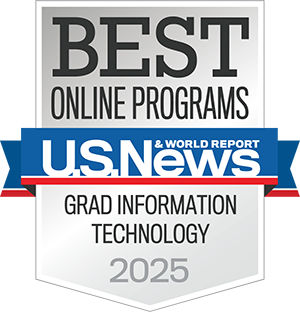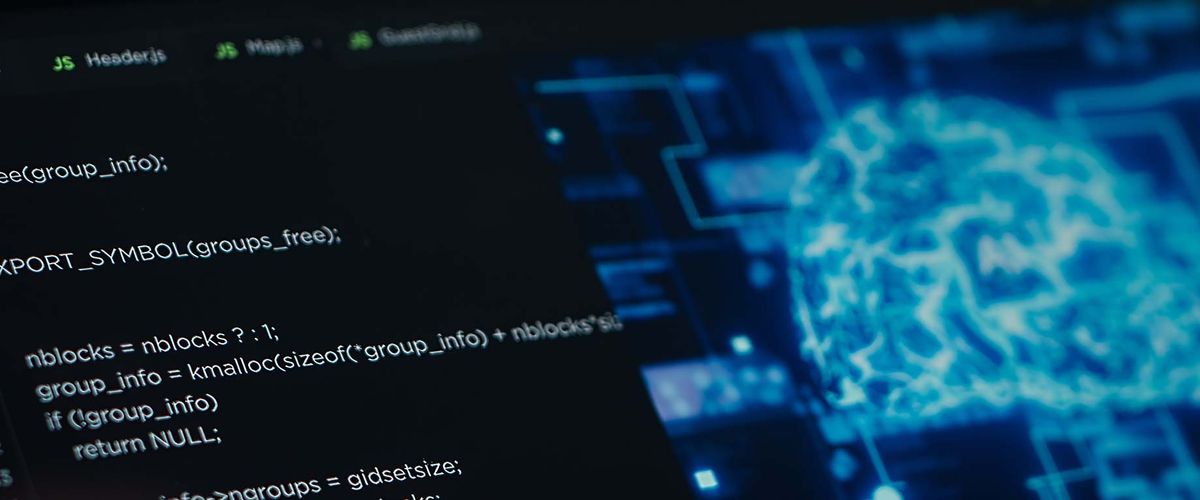Program at a Glance
- Online and On Campus
- Part-Time Study
- 16 Units
- 8 Months to Completion
- 19 Core Faculty
- No GRE/GMAT
- Tuition & Fees—Part-Time Study*: $14,478
*Based on 2025–2026 Boston University tuition and fees.
Gain Industry-Ready Knowledge in Applied Artificial Intelligence
The Graduate Certificate in Applied AI & Machine Learning at Boston University’s Metropolitan College (MET) provides intensive exploration of the theory and practice of neural nets, generative AI, automated reasoning, AI security, intelligent image processing, and reinforcement learning, as well as an overview of AI ethics.
BU MET’s Applied AI & Machine Learning certificate program prepares you for roles that require the ability to design and implement intelligent applications in engineering, business, and industry. Typical job titles might include machine learning engineer, data scientist, AI software developer, computer vision and natural language processing specialist, ethical AI analyst, AI product manager, and quantitative analyst. You’ll gain hands-on experience and practical skills that enable you to design, develop, and deploy intelligent applications across industries—equipping you to meet the growing demand for AI expertise in today’s technology-driven job market.
Why Earn a Graduate Certificate in Applied AI & Machine Learning at BU?
- Active Learning Environment: BU MET’s computer science courses ensure you get the attention you need, while introducing case studies and real-world projects that emphasize technical and theoretical knowledge—combining in-depth, practical experience with the critical skills needed to remain on the forefront of the information technology field.
- Engaged Faculty: In BU MET’s Computer Science master’s program, you benefit from working closely with highly qualified faculty and industry leaders who have hands-on involvement in data analytics, data science, data storage technologies, cybersecurity, artificial intelligence (AI), machine learning, software development, and many other areas.
- Extensive Network: Study computer science alongside peers with solid IT and business experience, learn from faculty who have valuable contacts across several sectors, and benefit from an alumni community with strong professional connections.
- 24:1 Average Class Ratio: Enjoy an exceptional student-to-instructor ratio, ensuring close interaction with faculty and access to support.
- Valuable Resources: Make use of Boston University’s extensive resources, including the Center for Career Development, Educational Resource Center, Fitness & Recreation Center, IT Help Centers, Mugar Memorial Library, Howard Thurman Center for Common Ground, George Sherman Union, Rafik B. Hariri Institute for Computing and Computational Science & Engineering, and many others.
- Flexible Evening Options: Study at the pace that works for you, evenings on campus or fully online. Courses begin fall, spring, and summer.
- Track Record: Learn from the best—BU MET’s Department of Computer Science was established in 1979 and is the longest-running computer science department at BU. Over the course of its existence, the department has played an important role in the emergence of IT at the University and throughout the region.
Rankings & Accreditations

#10, Best Online Master's in Computer Information Technology ProgramsMET's computer science & IT graduate certificates share curriculum with MET's online master's degrees in computer information technology, which are ranked #10 in the nation by U.S. News & World Report for 2025.
Build Skills in Machine Learning and Intelligent Systems
The four-course Applied AI & Machine Learning graduate certificate is part of BU MET’s portfolio of computer science and IT graduate programs. For over forty years, the Department of Computer Science at Metropolitan College has prepared students to tackle contemporary challenges in the field. Our programs are uniquely flexible—we offer courses evenings on campus, fully online, or in a blended format that combines online study with occasional campus visits—so you can balance graduate school with your career, family, and other obligations. We take pride in providing training in critical specialization areas and emphasizing practical, insightful, and adaptable knowledge that can be immediately applied on the job while informing your career growth for years to come. We also offer extensive advising to help you identify the subjects you’ll need to achieve your career goals.
Graduate with Expertise
Metropolitan College’s Applied AI & Machine Learning graduate certificate will equip you with the following skills:
- Advanced Machine Learning and Deep Learning: Students will be able to solve complex problems such as computer vision, natural language processing, and speech recognition using machine learning algorithms, including supervised and unsupervised learning models, neural network architectures, and deep learning techniques.
- Artificial Intelligence Development: Students will be able to design and implement agents and algorithms for self-learning systems, leveraging AI models for data representation and prediction, implementing evolutionary and genetic algorithms for optimization, and developing software systems that incorporate AI models to enhance capabilities.
- Ethical AI and Communication: Students will be able to evaluate the ethical implications of AI systems, ensuring model fairness, accountability, and transparency, and effectively communicating technical AI concepts to non-technical stakeholders.
Certificate-to-Degree Pathway
BU MET graduate certificate programs can serve as building blocks to a master’s degree. The Graduate Certificate in Applied AI & Machine Learning shares specific courses with the MS in Computer Science concentration in AI & Machine Learning. Students currently enrolled in a graduate certificate who are interested in transitioning into a master’s degree should contact their academic advisor to declare their interest in this pathway. A new master’s degree application is not required. Connect with a graduate admissions advisor at csadmissions@bu.edu to learn more about this option.
Graduate Certificate in Applied AI & Machine Learning Curriculum
A total of four courses (16 units) is required, as follows:
MET CS 577 Data Science with Python
Sprg ‘26
Prerequisite: MET CS 521 or equivalent. Or, instructor's consent. Students will learn major Python tools and techniques for data analysis. There are weekly assignments and mini projects on topics covered in class. These assignments will help build necessary statistical, visualization and other data science skills for effective use of data science in a variety of applications including finance, text processing, time series analysis and recommendation systems. In addition, students will choose a topic for a final project and present it on the last day of class. [ 4 cr. ]
| Section |
Type |
Instructor |
Location |
Days |
Times |
| A1 |
IND |
Pinsky |
|
W |
6:00 pm – 8:45 pm |
| A2 |
IND |
Pinsky |
|
T |
6:00 pm – 8:45 pm |
| O2 |
IND |
Mohan |
|
ARR |
12:00 am – 12:00 am |
MET CS 664 Artificial Intelligence
Sprg ‘26
Prerequisites: MET CS 248 and MET CS 342. - Study of the ideas and techniques that enable computers to behave intelligently. Search, constraint propagations, and reasoning. Knowledge representation, natural language, learning, question answering, inference, visual perception, and/or problem solving. Laboratory course. [ 4 cr. ]
| Section |
Type |
Instructor |
Location |
Days |
Times |
| A1 |
IND |
Kalathur |
EPC 208 |
M |
6:00 pm – 8:45 pm |
| O1 |
IND |
Mansur |
|
ARR |
12:00 am – 12:00 am |
MET CS 767 Advanced Machine Learning and Neural Networks
Sprg ‘26
Prerequisites: MET CS 521 and at least one of MET CS 577, MET CS 622, MET CS 673 or MET CS 682; or consent of instructor. Theories and methods for learning from data. The course covers a variety of approaches, including Supervised and Unsupervised Learning, Regression, k-means, KNN's, Neural Nets and Deep Learning, Transformers, Recurrent Neural Nets, Adversarial Learning, Bayesian Learning, and Genetic Algorithms. The underpinnings are covered: perceptron's, backpropagation, attention, and transformers. Each student creates a term project. [ 4 cr. ]
| Section |
Type |
Instructor |
Location |
Days |
Times |
| A1 |
IND |
Mohan |
CDS 263 |
R |
6:00 pm – 8:45 pm |
| O2 |
IND |
Alizadeh-Shabdiz |
|
ARR |
12:00 am – 12:00 am |
And one course selected from the following:
MET CS 688 Web Mining and Graph Analytics
Sprg ‘26
Prerequisites: MET CS 544, or MET CS 555 or equivalent knowledge, or instructor's consent. - The Web Mining and Graph Analytics course covers the areas of web mining, machine learning fundamentals, text mining, clustering, and graph analytics. This includes learning fundamentals of machine learning algorithms, how to evaluate algorithm performance, feature engineering, content extraction, sentiment analysis, distance metrics, fundamentals of clustering algorithms, how to evaluate clustering performance, and fundamentals of graph analysis algorithms, link analysis and community detection based on graphs. Laboratory Course. [ 4 cr. ]
| Section |
Type |
Instructor |
Location |
Days |
Times |
| A1 |
IND |
Hajiyani |
FLR 123 |
M |
6:00 pm – 8:45 pm |
| O2 |
IND |
Rawassizadeh |
|
ARR |
12:00 am – 12:00 am |
MET CS 699 Data Mining
Sprg ‘26
Prerequisites: MET CS 521, MET LB 103 and MET LB 104; and either MET CS 579 or MET CS 669; or consent of instructor. - Study basic concepts and techniques of data mining. Topics include data preparation, classification, performance evaluation, association rule mining, regression and clustering. You will learn underlying theories of data mining algorithms in the class and practice those algorithms through assignments and a semester-long class project using R. After finishing this course, you will be able to independently perform data mining tasks to solve real-world problems. [ 4 cr. ]
| Section |
Type |
Instructor |
Location |
Days |
Times |
| A2 |
IND |
Lee |
MCS B33 |
W |
6:00 pm – 8:45 pm |
| O1 |
IND |
Lee |
|
ARR |
12:00 am – 12:00 am |
MET CS 766 Deep Reinforcement Learning
Sprg ‘26
Prerequisites: MET CS 577 or consent of instructor. - This course focuses on reinforcement learning, covering fundamental concepts and advanced techniques. It begins with an introduction to reinforcement learning and key concepts, such as exploitation versus exploration and Markov Decision Processes. As the course progresses, it delves into state transition diagrams, the Bellman equation, and solutions to the Multi-Armed Bandits problem. Students will explore challenges and methods related to control and prediction. Then, they learn tabular methods, including Monte Carlo, Dynamic Programming, Temporal Difference Learning, SARSA, and Q-Learning. Afterwards, the course also extends into reviewing neural network concepts, covering convolutional and recurrent neural networks, and moves on to approximation methods for both discrete and continuous spaces, including DQN and its variants. Policy gradient methods, actor-critic methods. Finally, ethical considerations in AI and safety issues are also discussed. [ 4 cr. ]
| Section |
Type |
Instructor |
Location |
Days |
Times |
| A1 |
IND |
Mohan |
PHO 201 |
W |
6:00 pm – 8:45 pm |
MET CS 777 Big Data Analytics
Sprg ‘26
Prerequisite: (MET CS 521 & MET CS 544 & MET CS 555) or MET CS 577 or consent of instructor. An introduction to large-scale data analytics, focusing on both the foundational concepts and practical tools used in the field. Big Data analytics involves extracting meaningful, non-trivial insights from vast and complex datasets. You will explore key software tools and programming techniques commonly used by data scientists working with distributed systems. You will also learn core technologies for storing and processing large volumes of data, with a particular emphasis on cluster computing frameworks that follow the MapReduce paradigm, including Hadoop MapReduce and Apache Spark. Through hands-on assignments and projects, you will gain practical experience by implementing data processing algorithms and running them on real-world cloud platforms such as Amazon Web Services (AWS) and Google Cloud, utilizing educational credits and accounts provided for the course. [ 4 cr. ]
| Section |
Type |
Instructor |
Location |
Days |
Times |
| A1 |
IND |
Alizadeh-Shabdiz |
MCS B31 |
M |
6:00 pm – 8:45 pm |
MET CS 787 AI and Cybersecurity
Prerequisites: MET CS 577 or consent of instructor. This course provides an in-depth exploration of the critical intersection between Artificial Intelligence (AI) and cybersecurity, focusing on two interconnected themes: protecting AI systems from vulnerabilities and harnessing the power of AI to tackle cybersecurity challenges. As AI becomes a cornerstone of modern technology, ensuring the security of AI-powered systems against adversarial attacks, backdoor attacks, and model theft is essential. Simultaneously, AI offers transformative capabilities for malware detection, intrusion prevention, and malware analysis. Through a combination of theoretical foundations, hands-on exercises, and real-world case studies, students will delve into topics such as adversarial machine learning, backdoor injection and defense, IP protection, and privacy-preserving AI. They will also learn how to design and implement AI-driven tools for identifying and mitigating cyber threats in dynamic environments. The course emphasizes practical applications, encouraging students to build resilient AI systems and utilize advanced AI techniques to enhance system security and detect emerging threats. Hands-on labs based on existing tools are provided and required. [ 4 cr. ]
MET CS 788 Generative AI
Sprg ‘26
Prerequisites: MET CS 577, Python programming, mathematics required for machine learning, and familiarity with neural networks. Or consent of instructor. - The first part of the course covers statistical concepts required for generative artificial intelligence. We review regressions and optimization methods as well as traditional neural network architectures, including perceptron and multilayer perceptron. Next, we move to Convolutional Neural Networks and Recurrent Neural Networks and close this part with Attention and Transformers. The second part of the course focuses on generative neural networks. We start with traditional self-supervised learning algorithms (Self Organized Map and Restricted Boltzmann Machine), then explore Auto Encoder architectures and Generative Adversarial Networks and move toward architectures that construct generative models, including recent advances in NLP, including LLMs, and Retrieval Augmented Methods. Finally, we describe the Neural Radiance Field, 3D Gaussian Splatting, and text-2-image models. [ 4 cr. ]
| Section |
Type |
Instructor |
Location |
Days |
Times |
| A1 |
IND |
Rawassizadeh |
CAS B06A |
R |
6:00 pm – 8:45 pm |
MET CS 790 Computer Vision in AI
Sprg ‘26
Prerequisites: MET CS 566 or instructor's consent. - Students enrolled in this course will gain comprehensive insights into fundamental and advanced concepts within the dynamic realm of computer vision. The curriculum will focus on cutting-edge applications of deep neural networks in computer vision. Through hands-on experiences and practical exercises, students will learn to leverage computer vision and machine learning techniques to solve real-world challenges. This course not only equips students with theoretical knowledge but empowers them to apply these concepts effectively, fostering a deep understanding of how computer vision can be harnessed to address complex problems in diverse industries. [ 4 cr. ]
| Section |
Type |
Instructor |
Location |
Days |
Times |
| A1 |
IND |
Zhang |
MCS B31 |
T |
6:00 pm – 8:45 pm |
Computer Science Faculty
Tuition & Financial Assistance
Competitive Tuition
Our part-time rates are substantially lower than those of the traditional, full-time residential programs yet provide access to the same high-quality BU education.
Learn More
Comprehensive Financial Assistance
Our services include
scholarships, graduate loans, and payment plans.
Learn More
How Much Does This Program Cost?
BU MET programs offer the flexibility of part-time study, either on campus or online. Tuition, fees, and total program cost are determined by enrollment status. Course enrollment in this certificate program is 1–2 courses (4–8 units) in a semester, and tuition is charged the part-time per-unit rate.
Applied AI & Machine Learning Graduate Certificate
(Online and On Campus)
| Enrollment Status |
Part Time |
| Courses per Semester |
2 courses
(8 units) |
| Time to Degree |
2 semesters
(8 months) |
| Tuition* |
$567–$1,005
per unit** |
| Fees per Semester* |
$75 |
| Total Certificate Cost* |
$14,478 |
*Based on 2025–2026 Boston University tuition and fee rates.
**Cost per unit is determined by course number (100–599 = $567/unit, 600–999 = $1,005/unit).
Questions? Please contact us to hear from an Admissions Advisor who can help you determine the best enrollment pathway. For information regarding financial aid, visit BU MET’s Financial Aid page.
Get Started
Please visit the BU MET admissions page for details on how to apply, financial assistance, tuition and fees, requirements for international students, and more.
Apply Now
What to Read Next: MET Computer Science & IT Knowledge Center
News & Events
Events
Admitted Student Webinar: On-Campus Students Meet Your BU Classmates!
Day:
December 2nd, 2025
Time:
9:00am - 9:45am
Online
Details
Events
Admitted Student Webinar: On-Campus Students Meet Your BU Classmates!
Day:
December 2nd, 2025
Time:
1:00pm - 1:45pm
Online
Details
Events
The Inside Scoop: BU MET Graduate Admissions For Domestic Students (US Citizens & Permanent Residents)
Day:
December 3rd, 2025
Time:
12:00pm - 12:45pm
Online
Details
Back to Programs
























